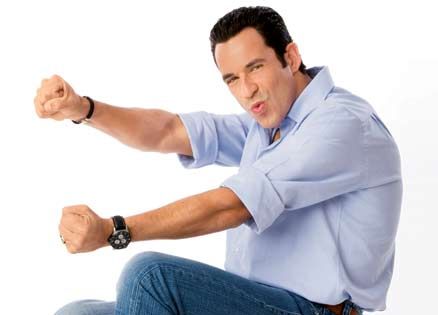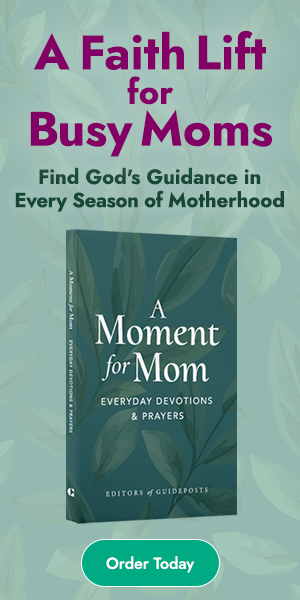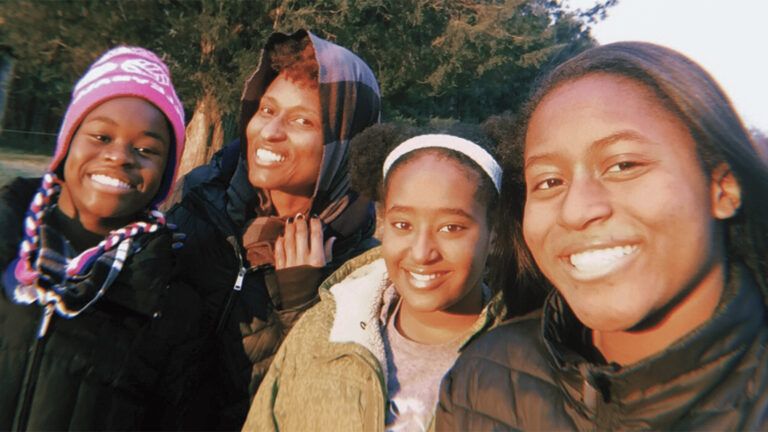That February of 1996 it snowed and snowed. Drifts piled in the street, on my front walk, at my door, making it almost impossible to go anywhere. That’s partly why I felt so alone, housebound in Columbus, Ohio, in the dead of winter.
Truthfully, I didn’t want to go out. I had no friends. I barely spoke English. My family was back home in Brazil. It’s summer there, I thought.
I’d moved to America, to Ohio, for one reason: to race. All my life, that had been my dream. Now I wondered if it was all a mistake. At 21, I was lonely, homesick, too shy to socialize, even with my race car crew. One morning I stared out the living room window at the snow and thought, I want to go home. To my family.
I picked up the phone and dialed. My mom answered. Maybe it was hearing her voice, so far away, that made me break down.
“I don’t want to race anymore,” I said. “I want to come home.”
Mom spoke softly, soothingly, her voice like a lullaby. “Remember when you first started racing?” she asked.
My mind drifted back to happier days. My father bought me my first go-kart when I was 11.
“You always wanted to go fast, Helio,” he told me. Go-karting was big in Brazil, a kind of school for beginning race car drivers. By 14, I was racing competitively around São Paulo, the state where I lived. I knew then—and so did my family—that driving was my future.
Yet following my dream was not easy. Few of the racers socialized with me. One young driver called me Red Foot. The name caught on. It meant that I came from a backwoods part of the country where the soil was dark red. It was their way of calling me a hick.
That was okay. I still had my family. We were so close, sometimes I felt as if I lived in a cocoon. My father financed my go-karts, and later my race cars. My older sister left her career as a ballerina to be my business manager. My mother showered me with prayers.
And we all knew one thing: To achieve my potential, I would eventually have to leave home. One day my parents sat me down. “You can’t stay in Brazil if you want to race seriously,” my father said.
“I know,” I said, torn between excitement and fear.
The day I left for England—one of Europe’s top racing circuits—was one of the most heartbreaking of my life, headed to a land where I didn’t speak the language, didn’t know a soul. I was 18. Racing was my destiny. Waving goodbye to my family at the airport, I thought, I have no choice. I must go.
Initially I was too caught up with racing to let my sense of isolation get me down. Six times in 1995 I finished in the top 10 in the British Formula 3 Championship Series for the Paul Stewart Racing team. I made a name for myself.
But without my parents, I realized, I was helpless. One night I sat in my apartment and stared at the refrigerator. I don’t even know how to cook. My only friend was a salesman who’d sold me some furniture. He was a racing fan and loved that I was a driver. Of course he spoke no Portuguese.
Then, a miracle! A Colombian go-kart racer I knew from The World Cup Series joined me on England’s racing circuit. Every so often we’d go out with his sister to dinner or to the movies. I’d just started to grow a little comfortable with my life when word came. “We’re transferring you to America,” the head of the Paul Stewart team told me. It was an exciting chance. But professionally and socially I’d have to start over.
Not long after, I made that call to Mom from Ohio. England had been bad enough, but this was awful.
“Come home, Helio,” she said.
I flew to Brazil. For a few days my family and I basked in our happy reunion. Then one quiet evening Mom and Dad sat me down.
“I know how hard you work to win,” Mom said. “We all know it. Your dream has become our dream. You love racing. You need to go back and see your dream through.”
“I’m not sure it’s my dream anymore,” I said, shaking my head.
Mom eyed me. “Let me read you something,” she said. She picked up the family Bible from the coffee table and opened it to Colossians 3:23-24.
“Whatever you do,” she read, “do your work heartily, as for the Lord rather than for men, knowing that from the Lord you will receive the reward of the inheritance.
“Dreams—real dreams—don’t come easily,” she continued. “Making them come true takes hard work. You’re a wonderful racer, but you’ll never succeed staying in your house, feeling sorry for yourself, missing us. We are your family, not your cocoon. Get out. Get to work. Mix with people, especially your team. Don’t be afraid of the world. When you become comfortable with yourself, you’ll do great things.”
I mulled over Mom’s words. A man is meant to work, to go out into the world and trust in God to make his dreams come true. I didn’t have to be with my family to carry their love with me. That love lived in my heart, not in a country.
Soon after, I returned home. To Columbus, Ohio, my new home. I worked hard to make friends, especially with my racing crew, and to learn the language. Five years later, in 2001, when I won the first of my three Indianapolis 500 championships, I rolled down Victory Lane, the sound of thousands of cheering fans in my ears. But the cheers that still meant the most to me were the ones from my family.
Download your FREE ebook, Inspirational Quotes About Life, Love, Faith and Hope.






